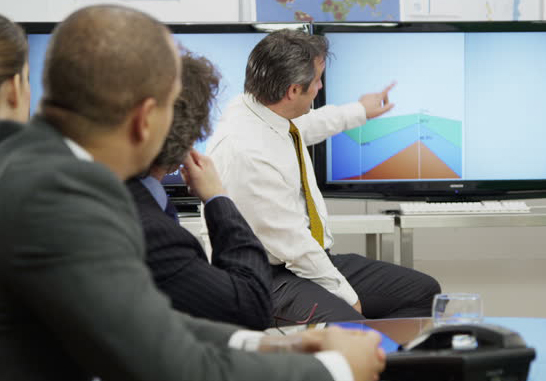
Oct 23, 2018 | Events, News
This side event will be held on October 25th, 2018, from 13:00 until 14:30 at Room XXVII, Palais des Nations, United Nations, in Geneva.
Organized jointly by the ICJ, the International Institute for Sustainable Development (IISD) and the Friedrich Ebert Stiftung (FES), this session’s goal is to provide a platform for discussion about the benefits and shortcomings of the current model of dispute settlement on investment matters and the needs and directions of future reform.
The debate will assist all participants in the World Investment Forum in understanding the current issues regarding investment dispute settlement and the needs and options for reform with a view to foster a strategy where investment-related dispute settlement and rule of law principles contribute to the sustainable development objectives.
The objectives of the event:
- Provide a platform for informed discussion among practitioners and interested stakeholders in the area of investment-related dispute settlement
- Contribute to an improved understanding of the issues at stake and the options for future reform
- Contribute to the efforts of the international community to achieve common ground in various issues related to investment-related dispute settlement
Issues for debate:
- What should governments expect from the ongoing UNCITRAL process in reforming investor-State dispute settlement (ISDS)?
- Should substantive and procedural issues relating to the current model of dispute settlement on investment matters be addressed in a comprehensive way?
- What are the elements to be considered when discussing the possible creation of an investment court?
- Would people impacted by investment projects have a role and standing in investment-related dispute settlement?
Speakers:
Vu Thi Chau Quynh, Deputy Director General, Department of Legislation, The Ministry of Planning and Investment, Viet Nam
Kekeletso Mashigo, Director, Legal – International Trade, Investment, Tax Trade Negotiations Unit, International Trade and Economic Development Division, Department of Trade and Industry, South Africa
Colin Brown, Deputy Head of Unit – Dispute Settlement and Legal Aspects of Trade Policy – DG TRADE – European Commission
Samira Sulejmanovic, Head, Unit for Bilateral Trade Relations, Ministry of Foreign Trade and Economic Relations, Bosnia and Herzegovina
Jane Kelsey, Professor, Faculty of Law, The University of Auckland, New Zealand
Moderator:
Sam Zarifi, Secretary-General of the ICJ.
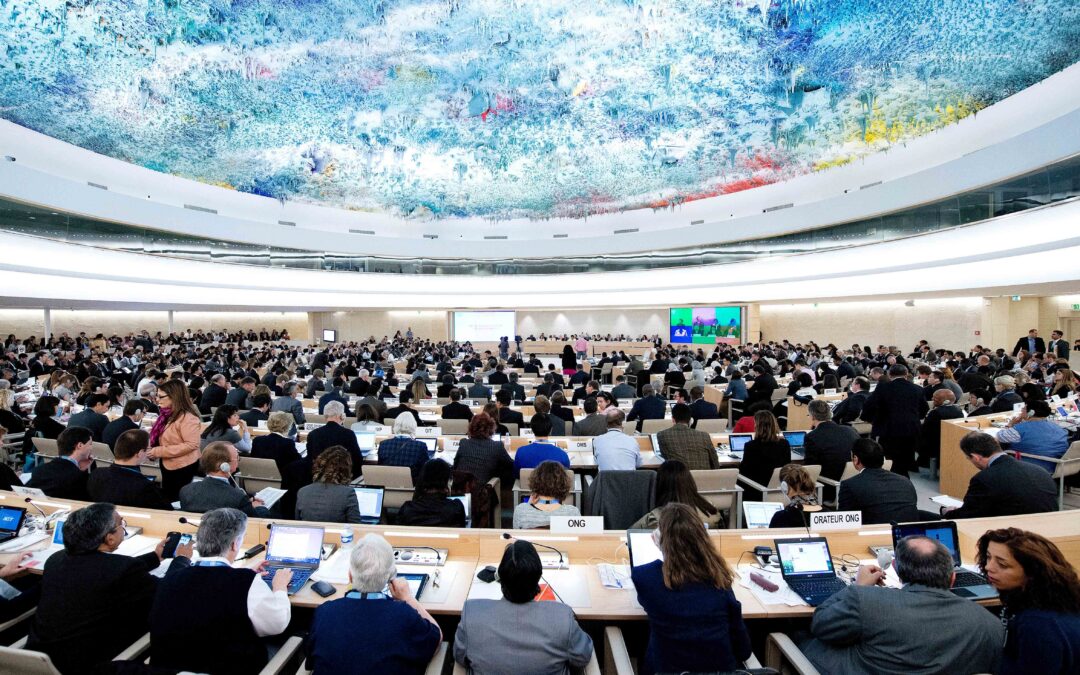
Oct 12, 2018 | Events, News
First side event: Multi-stakeholder dialogue on the scope and content of a treaty on business and human rights, Monday 15 October 2018, from 13.00-15.00, Room XXVII, Palais des nations.
Second side event: What kind of international monitoring and/or adjudicating mechanism do we need? Tuesday 16 October 2018, from 13.00-15.00 Room XXI, Palais des nations.
On 26 June 2014, the United Nations Human Rights Council (HRC) adopted Resolution 26/9 establishing an “open ended intergovernmental working group on transnational corporations and other business enterprises with respect to human rights” with the mandate to “elaborate an international legally binding instrument to regulate, in international human rights law, the activities of transnational corporations and other business enterprises”.
The first two sessions were dedicated to open deliberations about the format, scope and content of the future instrument, and a document with «elements» of the treaty was presented to the third session in 2017.
The fourth session of the OEIWG opens on 15 October with a «zero draft» of a treaty prepared by the Working Group Chairperson on the table for discussion.
The draft has so far met a mixed reception.
While much of the debate on a treaty has focussed on substantive questions around the scope and nature of substantive rights and responsibilities, the international monitoring and adjudicating mechanism has so far received far less attention.
Both side events organized on October 15-16 by the ICJ will be a space of discussion where stakeholders will be invited to share their views on key sections of the «zero draft» on business and human rights as well as on the best way to proceed in the negotiations in the next period.
Multi-stakeholder dialogue on the scope and content of a treaty on business and human rights (flyer in PDF)
What kind of international monitoring and/or adjudicating mechanism do we need? (flyer in PDF)
Contact:
Carlos Lopez, ICJ Senior Legal Adviser, t: 022 979 3816; e: carlos.lopez(a)icj.org
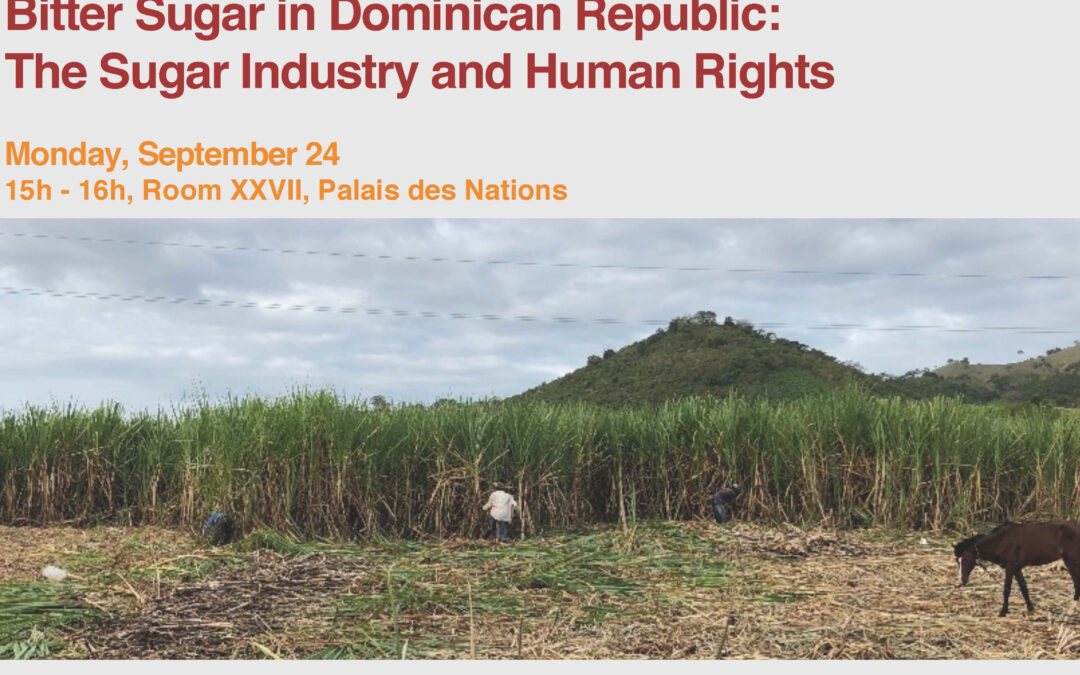
Sep 19, 2018 | Events, News
The ICJ will host the side event, “Bitter Sugar in Dominican Republic: The Sugar Industry and Human Rights” on Monday, 24 September 2018 from 15:00-16:00, Room XXVII, at the Palais de Nations in Geneva.
Together with tourism, sugar production is one of the major industries and one of the biggest sources of employment in the Dominican Republic.
This small Caribbean State remains one of the world’s top sugar suppliers to the USA.
While sugar production and export in the Dominican Republic is a major source of income for the country, the adverse impacts of its production are various.
Destruction of the environment, reduced access to land for local communities, forced evictions and precarious working conditions in sugarcane plantations are unfortunately a reality in many regions of this Caribbean State.
Whilst the Dominican Republic has shown in past years a preparedness to abide by and implement international standards on matters related to business and human rights, the country continues to face many challenges and evidence of human rights violations on the ground still portrays a complicated reality.
Two recent examples involving the sugar cane industry illustrate ongoing concern about human rights abuses in the Dominican Republic.
In 2016, armed agents of one of the largest sugar producers in the country, Central Romana Corporation, forcibly evicted from their homes more than 60 families during the night.
No alternative accommodation or reparations have been provided to the victims to redress the destruction of their homes and the trauma caused by the violence of the evictions.
In 2017, the Vicini Group, the second main sugar producing company in the country, used the pesticide Glyphosate in such a way that many were in danger of death and that it destroyed the crops of peasant farmers and workers.
To date, the human rights violations in both cases continue to be unpunished.
There is a growing international concern that the sugar cane industry in the Dominican Republic is somehow able to act with impunity when it comes to human rights violations.
Bearing in mind the upcoming Universal Periodic Review of Dominican Republic, in which all UN Member States will examine the human rights situation in the country, this side event is aimed at informing and shedding light on this little known reality in the Dominican Republic as well as to brief State delegations about the importance of addressing this issue in their review of the Dominican Republic.
The event will also provide a space for constructive dialogue among various actors, including the Government of the Dominican Republic.
Panelists:
– Carlos Lopez, Senior Legal Adviser, International Commission of Jurists
– Fr. Damián Calvo Martin OP, Director, Centro de Teología Santo Domingo de Guzman
– María Magdalena Álvarez Gálvez, victim of forced evictions by Central Romana Corp.
Moderator: Rory Gogarty, High Court of England and Wales
Interpretation: Will be provided from English to Spanish and Spanish to English
Dominican Republic Sugar Industry Side Event Flyer 24 Sept. (flyer of the event in pdf)
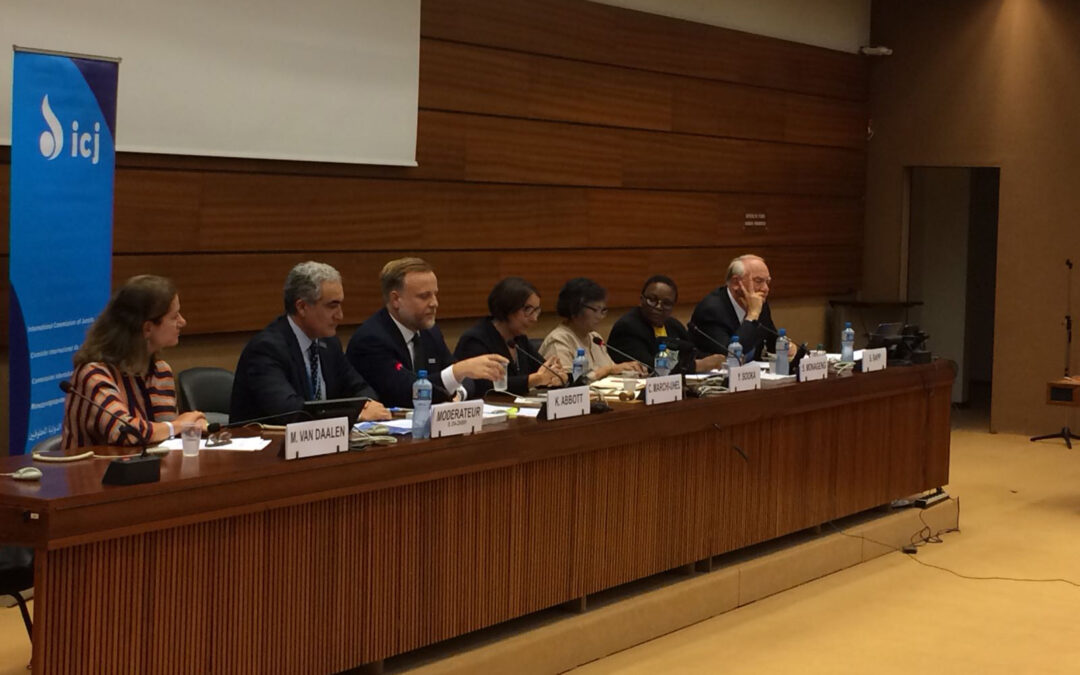
Sep 18, 2018 | Events, Multimedia items, News, Video clips
The ICJ organized this side event today (Tuesday 18 September 2018), in cooperation with the Permanent Mission of the Netherlands, at the Human Rights Council.
https://www.facebook.com/ridhglobal/videos/1005764152964172/
Background
Particularly when crimes under international law are perpetrated on a large scale in situations of crisis, there is an urgent need to preserve evidence for use in eventual criminal proceedings, whether at the International Criminal Court or other national or international tribunals
Too frequently, obstacles prevent immediate direct recourse to international courts and prosecutors. One response has been the creation of mechanisms to collect and preserve the evidence in the meantime. Examples include the International Independent and Impartial Mechanism (IIIM) for Syria, and the Commission on Human Rights in South Sudan.
At the current session of the Human Rights Council, the Fact-Finding Mission on Myanmar has called for establishment of an IIIM pending referral to the ICC or an ad hoc tribunal.
Opening Remarks:
Ambassador Monique T.G. van Daalen, Permanent Mission of the Netherlands
Moderator:
Saman Zia-Zarifi, Secretary General, International Commission of Jurists
Panelists:
- Catherine Marchi-Uhel, Head, International, Impartial and Independent Mechanism (IIIM) for Syria
- Yasmin Sooka, Chairperson, Commission on Human Rights in South Sudan
- Sanji Monageng, former Judge/Vice-President of the ICC, and Commissioner of the ICJ
- Stephen Rapp, Chair, Commission for International Justice & Accountability (CIJA), Distinguished Fellow, US Holocaust Memorial Museum, and former United States Ambassador-at-Large for Global Criminal Justice
- Kingsley Abbott, ICJ Senior Legal Adviser (Global Accountability), formerly with the Extraordinary Chambers in the Courts of Cambodia and the Special Tribunal for Lebanon
Universal-ICJ-NL-Side event-News-events-2018-ENG (flyer of the event in PDF)
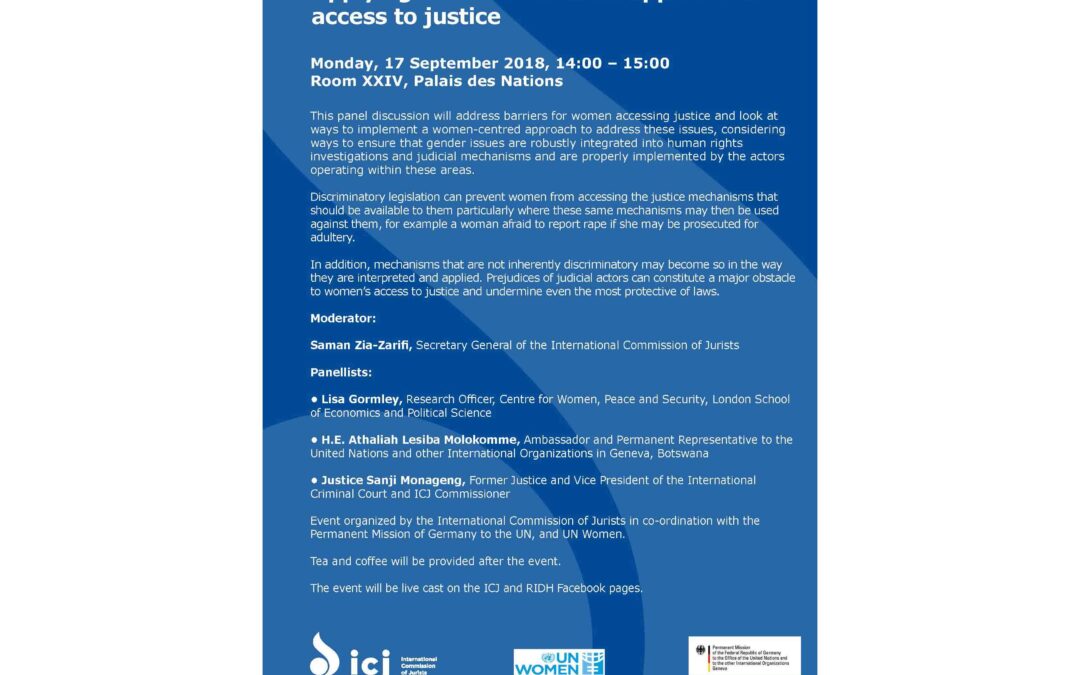
Sep 17, 2018 | Events, Multimedia items, News, Video clips
This panel discussion was held today at the Palais des Nations in Geneva.
The event addressed barriers for women accessing justice and look at ways to implement a women-centred approach to address these issues, considering ways to ensure that gender issues are robustly integrated into human rights investigations and judicial mechanisms and are properly implemented by the actors operating within these areas.
Discriminatory legislation can prevent women from accessing the justice mechanisms that should be available to them particularly where these same mechanisms may then be used against them, for example a woman afraid to report rape if she may be prosecuted for adultery.
In addition, mechanisms that are not inherently discriminatory may become so in the way they are interpreted and applied. Prejudices of judicial actors can constitute a major obstacle to women’s access to justice and undermine even the most protective of laws.
Moderator:
Saman Zia-Zarifi, Secretary General of the International Commission of Jurists
Panellists:
• Lisa Gormley, Research Officer, Centre for Women, Peace and Security, London School of Economics and Political Science
• H.E. Athaliah Lesiba Molokomme, Ambassador and Permanent Representative to the United Nations and other International Organizations in Geneva, Botswana
• Justice Sanji Monageng, Former Justice and Vice President of the International Criminal Court and ICJ Commissioner
Event organized by the ICJ in co-ordination with the Permanent Mission of Germany to the UN, and UN Women.
Watch the video:
https://www.facebook.com/ridhglobal/videos/565112000574216/
Side event ICJ WHR (flyer in PDF)
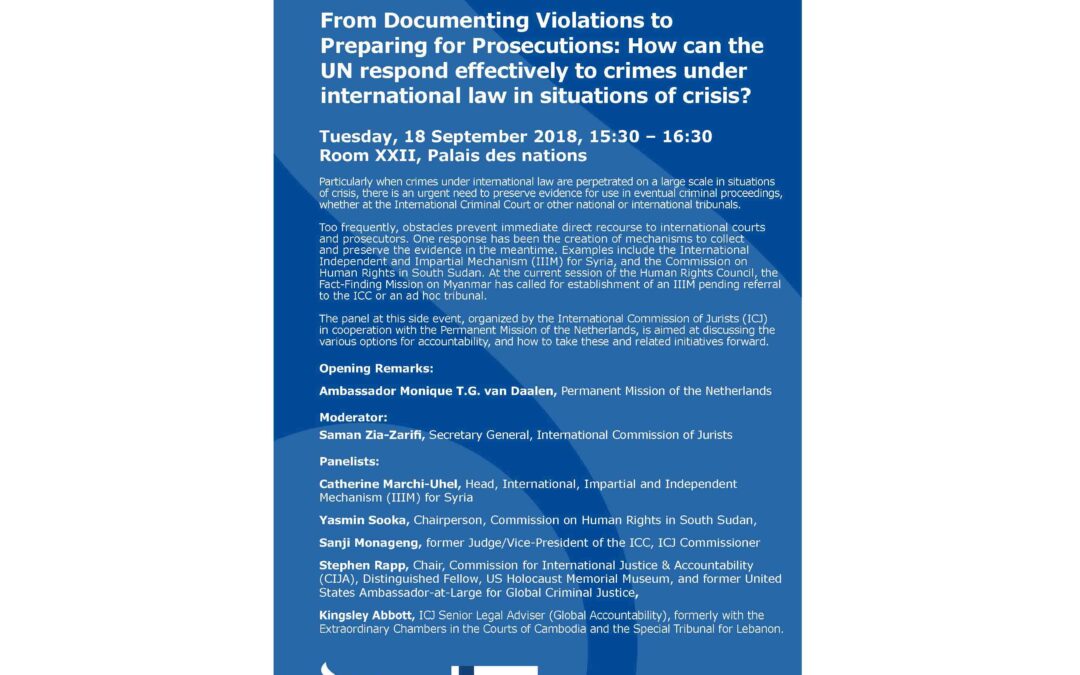
Sep 11, 2018 | Events, News
The ICJ will organize this side event, in cooperation with the Permanent Mission of the Netherlands, at the Human Rights Council on Tuesday 18 September 2018 from 15:30 – 16.30 in Room XXII of the Palais des Nations.
Particularly when crimes under international law are perpetrated on a large scale in situations of crisis, there is an urgent need to preserve evidence for use in eventual criminal proceedings, whether at the International Criminal Court or other national or international tribunals
Too frequently, obstacles prevent immediate direct recourse to international courts and prosecutors. One response has been the creation of mechanisms to collect and preserve the evidence in the meantime. Examples include the International Independent and Impartial Mechanism (IIIM) for Syria, and the Commission on Human Rights in South Sudan.
At the current session of the Human Rights Council, the Fact-Finding Mission on Myanmar has called for establishment of an IIIM pending referral to the ICC or an ad hoc tribunal.
The various options for accountability, and how to take these and related initiatives forward will be discussed.
Opening Remarks:
Ambassador Monique T.G. van Daalen, Permanent Mission of the Netherlands
Moderator:
Saman Zia-Zarifi, Secretary General, International Commission of Jurists
Panelists:
- Catherine Marchi-Uhel, Head, International, Impartial and Independent Mechanism (IIIM) for Syria
- Yasmin Sooka, Chairperson, Commission on Human Rights in South Sudan
- Sanji Monageng, former Judge/Vice-President of the ICC, and Commissioner of the ICJ
- Stephen Rapp, Chair, Commission for International Justice & Accountability (CIJA), Distinguished
Fellow, US Holocaust Memorial Museum, and former United States Ambassador-at-Large for Global Criminal Justice
- Kingsley Abbott, ICJ Senior Legal Adviser (Global Accountability), formerly with the Extraordinary Chambers in the Courts of Cambodia and the Special Tribunal for Lebanon
Universal-ICJ-NL-Side event-News-events-2018-ENG (flyer of the event in PDF)










